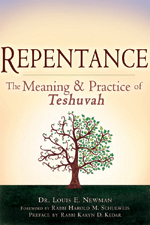The Kosher Bookworm: New takes on repentance
The Kosher Bookworm
Issue of September 3, 2010/ 24 Elul 5770The classical rabbinic writings of teshuvah, repentance, are found in great number on the shelves of Jewish libraries worldwide. Teshuvah has been the center of much Jewish theological thought and discussion. However, for the most part, those interested in teshuvah were forced to content themselves with simple translations, mediocre commentaries and numerous well-intentioned rabbinic sermons that attempted to make teshuvah relevant to today’s world.On the other hand, “Ascending the Path: Insights Into Rabbi Moshe Hayyim Luzzatto’s Mesillat Yesharim” is a successful and practical classic. The commentary by Rabbi Yaakov Hillel, the rosh yeshiva of Yeshivat Ahavat Shalom in Jerusalem, goes into practical detail to explain the concepts of teshuvah and the value of its effective and successful practice for contemporary Jewry today. The book is helpful to both the uninitiated and the learned. Rabbi Hillel’s success is apparent in his colloquial, yet eloquent, language which brings opens this once closed book to the thousands of Jews who can benefit from it. For that we are endeared to Debra and Richard Parkoff of Lawrence whose untiring efforts enabled this work to see the light of day. This book will surely help many gain true spiritual enhancement during the upcoming holiday experience. The Ramchal’s spiritual legacy has truly been enhanced through this effort. Hopefully the Parkoff example will inspire others to do likewise on behalf of other cognate classical Jewish works.
This year also witnessed the publication of “Repentance: The Meaning and Practice of Teshuva”, [Jewish Lights, 2010], by Dr. Louis Newman, a professor of religious studies at Carlton College in Minnesota. Dr. Newman presents a modern rendition of the ancient concept of teshuvah, thus making it understandable and comprehensible to those for whom repentance, as a religious code of behavior, is a foreign mode of conduct.
Admittedly, teshuvah is a complex subject and Newman is the first to acknowledge this. The book is organized as a discussion with the reader rather than lecture to the otherwise uninitiated.
The concepts of sinfulness, and atonement as well as their psychological, moral and spiritual dimensions are dealt with in a non-adversarial manner. Each concept is given its due, and supplemented with examples and quotes from the familiar contemporary scene. The presentation gives the reader the feeling that what is being brought to them is of a relevance, worth both their immediate and serious attention.
For the majority of Jews today, the call to teshuvah, as garbed in the tone of the old order ring hallow. This does not mean that teshuvah is an irrelevant concept, but rather that the methods employed to teach and explain it are in need of a new manner of presentation and vocabulary. In this regard, Newman performs exemplary. Under Newman's careful hands, old values and concepts are not compromised. There is no debunking of religious synagogue, home-based ritual, time honored sacred mitzvoth and other “old time” strictures. Rather, Newman gives our faith and its quest for human spiritual progress a new and refined purpose, a new glow to make any religious traditionalist proud.
“Repentance: The Meaning and Practice of Teshuva” represents a new genre of literature in this field that will hopefully make the high holiday experience more meaningful to those of us who are unschooled in the deeper meanings of Teshuva.
Once again, The Sh’or Yoshuv Institute is to be complimented for publicizing another liturgical commentary by Rabbi Yitzchok Sender of Chicago. This year’s brief 36-page study is titled, “An In Depth Study of the Rosh Hashanah Mussaf Prayer.” The work explains some of the concepts that went into the structure of the longest continuous liturgical service of the Jewish year. Rabbi Sender describes the basic order of prayer, the differences between Ashkenaz and Sefard prayer services, the position of Rabbi Yochanan ben Nuri concerning Keddushas Hashem and the attendant sections at the heart of the service. Rabbi Sender also gives a detailed explanation of the 10 verses of the three basic sections of Malchiyos, Zichronos, and Shofros. This handsome little booklet is a great supplement to your machzor and is available through the yeshiva by calling 516-239-9002. You will not regret the effort nor the study of Rabbi Sender’s scholarship.






